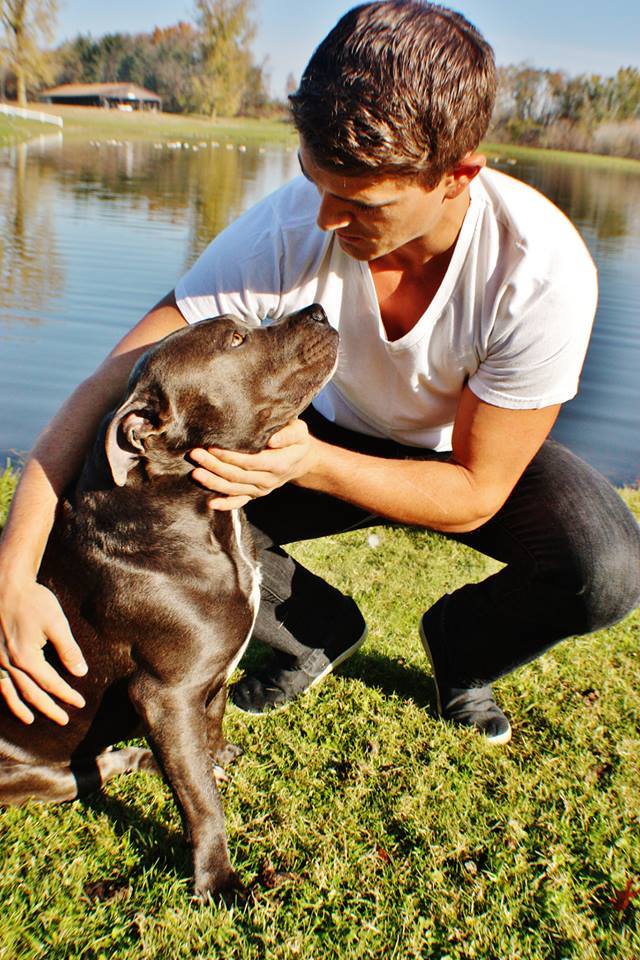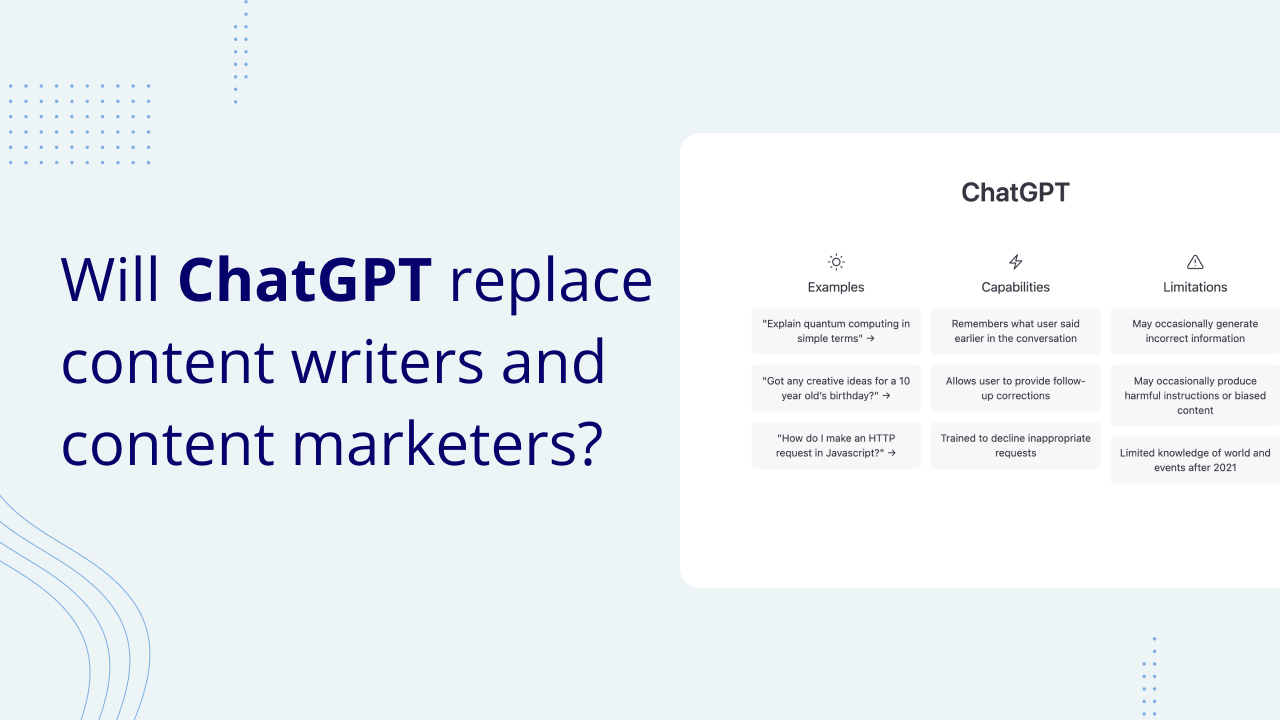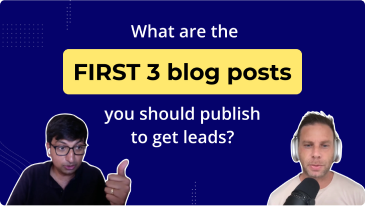I’m a content marketer, I’ve spent the last 3 months traveling, and I love using Airbnb when I travel.
But I have to admit… I have a problem with Airbnb.
You see, to my surprise, when I went to the Airbnb blog recently, I saw the typical self-serving brand related content that most companies put out. You know what I’m talking about…
The press releases…
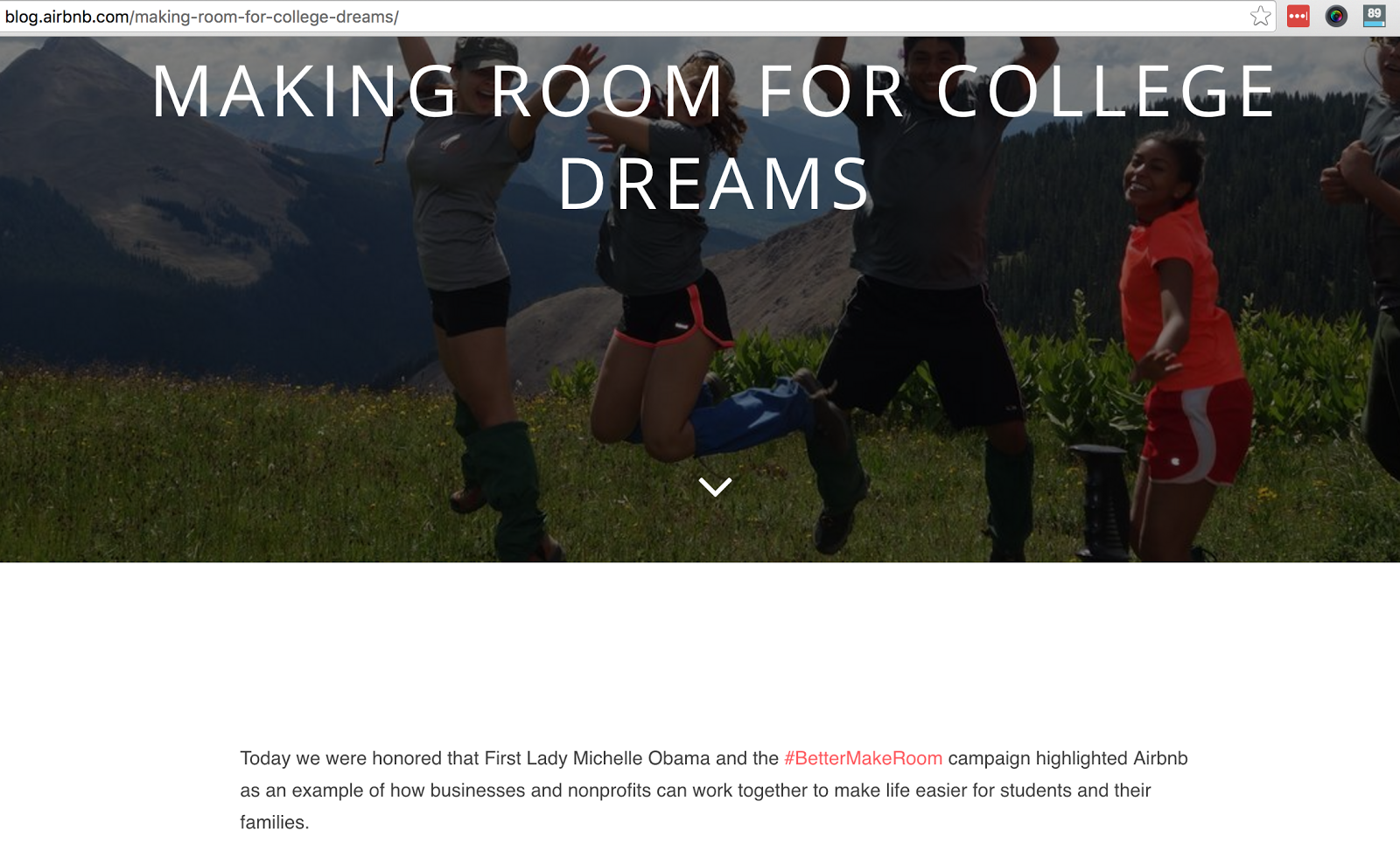
The product updates…
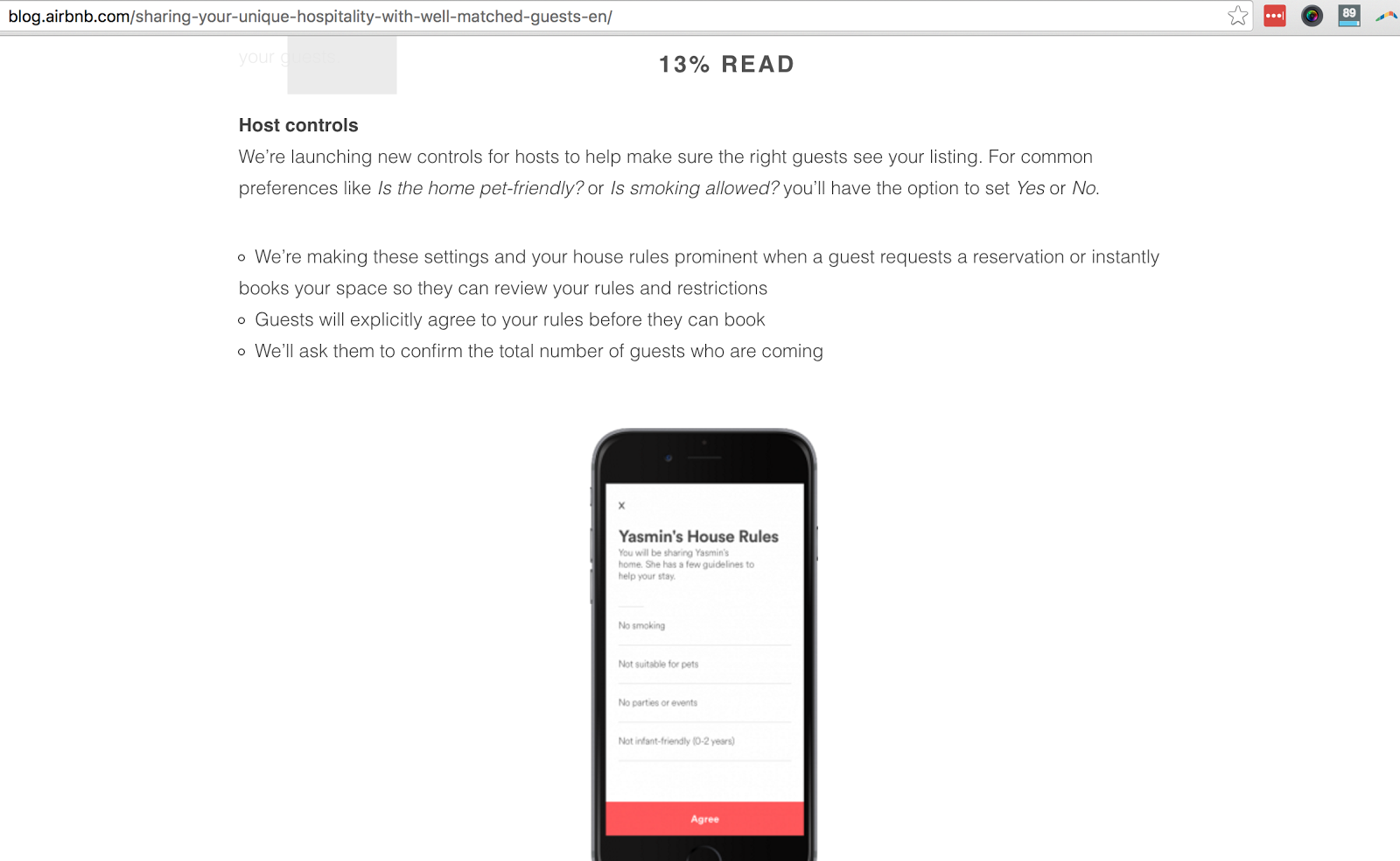 The Case Studies…
The Case Studies…
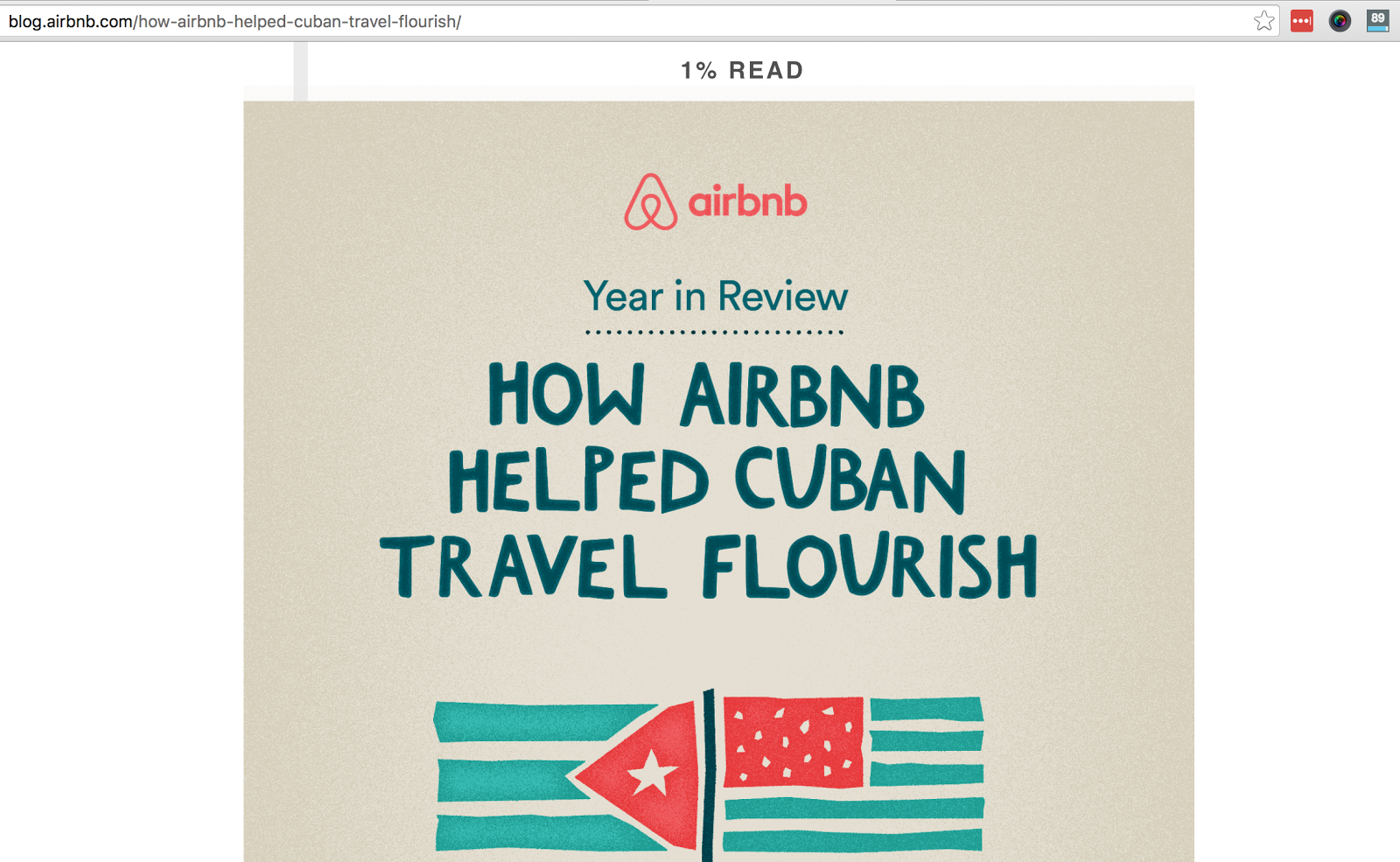
The kind of content that companies think is really interesting, but that few people read or connect with.
My problem is:
It pains me to see the opportunity that Airbnb is missing out on by not focusing on the right kind of content marketing as a way to scale their business.
Airbnb’s goal is to become one of the world’s largest community-driven superbrands.
But in order to accomplish that goal, they’re missing one really important thing:
A solid content strategy for their blog.
My hypothesis is:
If Airbnb were able to capture stories from both their hosts and travelers about their experience using Airbnb, it would lead to higher brand awareness, stronger relationships with their community, more positive media attention, increased results in the SERPs, wider adoption, and more profit.
So that being said, in true Grow and Convert fashion, we’re going to walk through how we would run content marketing for Airbnb’s blog. In doing so, we hope that people learn how to create a content strategy for a two-sided marketplace and how to capitalize on user-generated content to scale a business.
Why Airbnb Needs to Shift Their Content Strategy To User Generated Content
A big mistake that I see a lot of companies make is that they use their blog to share product updates, press releases, case studies, company updates, etc. Many companies do this because they don’t have anywhere else on their site to share this type of information.
But the problem with that type of content is that most existing users don’t find it interesting and it doesn’t help attract new users to the platform.
If you’re going to spend company time and resources on content marketing, then the goal should be to use content to build the brand, community, attract new customers and strengthen relationships amongst existing customers.
If they tackle content marketing the right way, it will lead to higher brand awareness and higher revenue.
You don’t need to be salesly in order to do this.
All you need is the proper content strategy.
What Airbnb needs to do is turn their blog from a company updates feed, into an engaging collection of stories from their hosts and travelers about the motivations behind why they use Airbnb and the experiences from using the platform.
It’s that simple.
If they’re able to successfully pull this off, existing-users and non-users will connect with people’s personal stories and it will inspire more people to use Airbnb — and make no mistake Airbnb users have amazing stories.
Let me explain further.
According to this post, 500,000 people stay in an Airbnb every night around the world.
If you multiply that by how many days there are in a year, that equals 182,500,000 bookings every year.
That’s a large number of people that have experienced Airbnb, but have not likely shared their experience with others. If Airbnb could get only 1% of people to share their story on their site, that would be 1,825,000 new pieces of content that Airbnb could generate each year.
Imagine the implications that this would have for the brand, awareness, community and SEO…
The Type of User-Generated Content That Airbnb Should Publish To Attract More Guests
Following the previous framework I created on content strategy, Airbnb needs to focus in on two types of content: (1)shareable and (2) evergreen. Let’s see how that framework would apply to Airbnb.
The two types of content that would work well to attract more guests to Airbnb’s platform and strengthen their community are:
- Personal stories from their user-base (Sharable Content)
- City and country guides, reviews of local restaurants and attractions (Evergreen Content)
Sharable Content: Why Airbnb Should Focus on Personal Stories From Their User-Base
I used Airbnb for the first time in February when I embarked on my journey abroad.
I had known about Airbnb for 5+ years, worked 3 blocks away from their headquarters, and have had tons of friends that swore by it.
But I never felt compelled to use the platform.
Now having used Airbnb as a traveler, I completely understand the value.
From my perspective, the value of using Airbnb is:
- You get to experience travel from a local’s perspective by staying in someone’s home or guest house.
- You get a contact person in your destination who can provide you with information about the place you’re traveling to before you even get there.
- It can be a great value – in comparison with hotels and traditional accommodation, a lot of times Airbnb offers a better deal
- Instead of transactional relationship like you’d have with a hotel, Airbnb is more about community. You build connections, relationships, and you feel at home when you stay at an Airbnb
Now imagine there were stories from real users that shared the value of Airbnb but in their own words, through personal stories.
For example:
I might tell the story of how I stayed with a local family in Bali and they took me to Padang Padang Beach for the Kuningan ceremony. I was one of two non-locals who got to experience the ceremony and learn about the Hindu culture. That experience wouldn’t have been made possible without Airbnb.



I might tell the story of how I left San Francisco to go abroad while I bootstrapped Grow and Convert, and how I needed a place abroad with good WiFi but didn’t know if Bali was going to be a good working destination for me. I was able to ask my host after booking my first Airbnb in Bali about WiFi in the area, and what SimCard I should get before entering the country. I ended up staying in that guesthouse for 2 months because I loved the family and it was a perfect working environment for me.
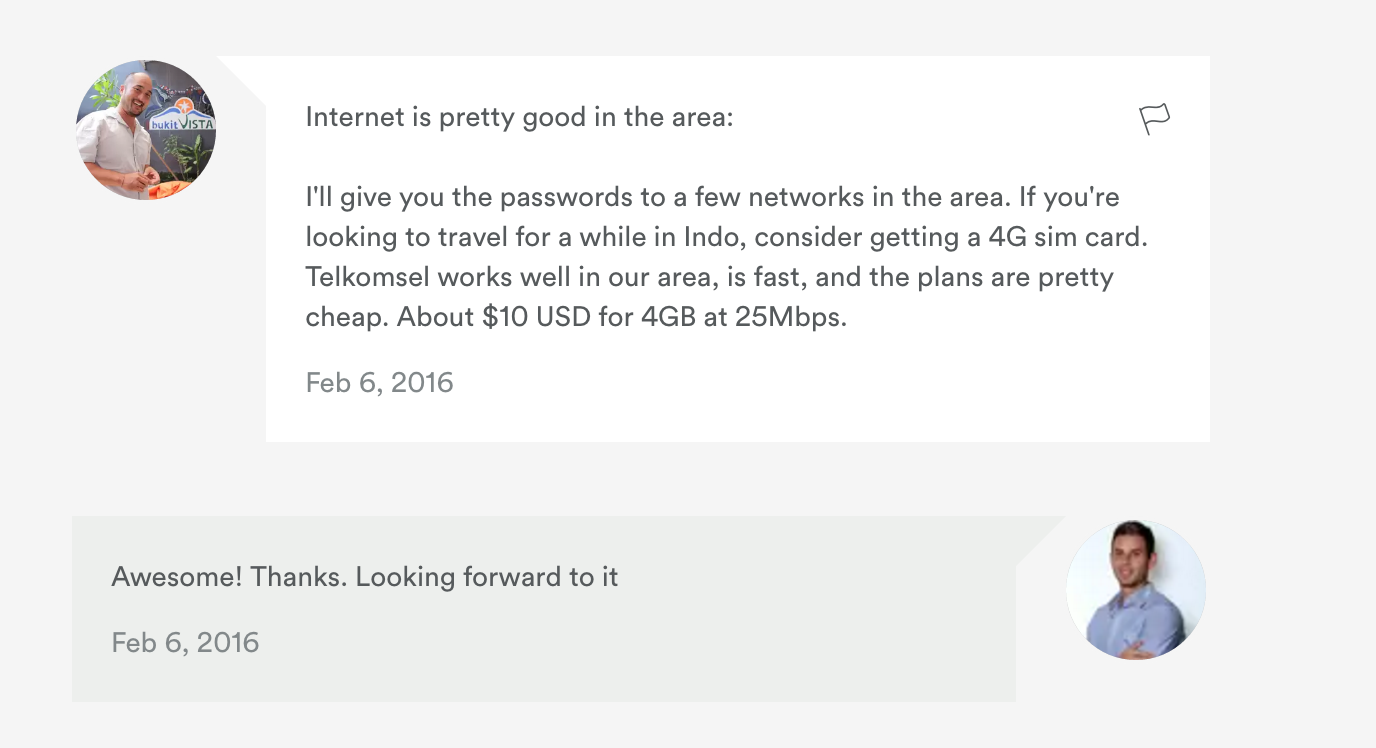
I might tell the story about how I felt homesick after 2.5 months of traveling, but found a new definition of what home was to me after staying at a hostel that I found on Airbnb in Vietnam.
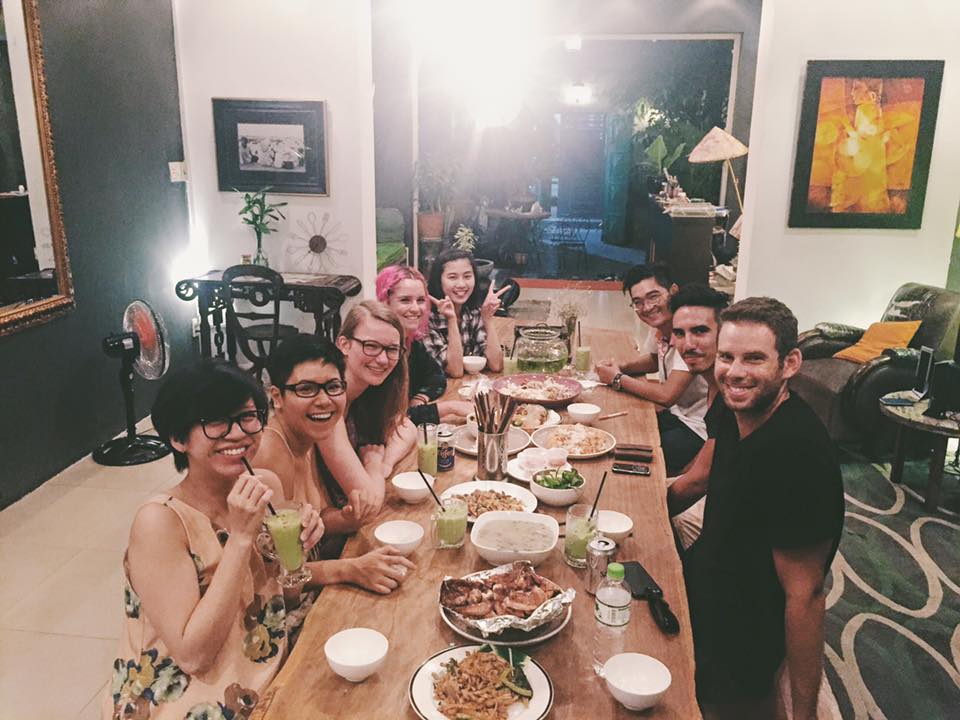
Now think about this: I’m only one person, so there are millions of other stories just like these ones that are waiting to be shared. These stories will help people connect to others’ travel experiences and share the value of Airbnb through someone else’s eyes.
Stories like this are priceless for brand building and awareness. Not to mention they are an unfair advantage for Airbnb. What stories is Hilton going to write to compete with this? How a couple rented the east ballroom for their wedding? These stories also have built in social proof — an established persuasion principle that helps in online conversion optimization. It will give people a unique reason to try Airbnb by sharing the motivation behind why someone uses the platform and how it changed their travel experience.
Evergreen Content: Why Airbnb Should Focus on User-Generated City and Country Guides, Travel Reviews
When it comes to travel accommodation, Airbnb isn’t just competing with hotel chains like Marriott and Hyatt, the travel aggregators like Booking.com and Kayak, or the local travel agent.
They’re also competing with community sites like TripAdvisor and Lonely Planet – where people might go for research prior to ever booking accommodation.
Right now, though, they don’t compete well on this travel research front. Think about it, have you ever heard someone say “Oh I read about this travel destination on Airbnb’s website…”
Imagine if Airbnb had it’s own resources provided by travelers that gave their recommendations on things to see, restaurants to eat at, and general travel tips. A guide to a city.
For example:
When I arrived in Ho Chi Minh City a couple weeks back, I stayed in District 5. After being there for a little over a week, I was able to search out some of the best restaurants and got some great recommendations from locals there on what to do.
What if Airbnb asked me to share some of my recommendations in a guide on District 5. This would be useful to other travelers traveling to the same Airbnb location, or another one around it, and would also be really good for SEO purposes. It could be used as an acquisition tool.
If I was traveling to a new destination, I’d likely do some research on the area I was staying before booking accommodation. If properly executed on, Airbnb content could be one of the top search results if they were able to compile traveler recommendations or get people to write full guides on specific areas.
So instead of having TripAdvisor or Lonely Planet come up in the search results, and have those sites make money off of accommodation listings, Airbnb could own the SERPs and serve up Airbnb accommodations specific to that area.
If real Airbnb users shared recommendations from past experience, it would help build community amongst Airbnb members.
How Airbnb Could Use A Similar Strategy To Attract New Hosts
Using the same framework that I mentioned above, Airbnb needs to go after both shareable and evergreen content to attract new hosts to the platform.
Shareable and evergreen content for the host side of the platform would be:
- Unique personal stories that inspire people to host their property on Airbnb (shareable).
- Guides to hosting from current Airbnb members (evergreen)
How Airbnb Could Use User-Generated Personal Stories to Attract New Hosts
I remember the first time I considered hosting on Airbnb, and at the time, I didn’t even own a house.
I had read a story from my friend Greg Muender about how he was bootstrapping his startup by using Airbnb.
I thought:
‘That’s really cool, I had never thought of using Airbnb that way.’ And even though I didn’t own a house, it made me want to figure out a way to buy one just so I could make money in a similar fashion.
But my point isn’t to encourage people to buy a house to use Airbnb to make money.
My point is that people have all different motivations for hosting their property on Airbnb, and Airbnb isn’t doing a good job at capturing those stories and using them to inspire others.
For some people, the reason might be:
- To make some extra income like Greg’s story
- To meet new people
- To learn a new language
- To share their culture and traditions with others
And there’s probably 100 more!
When I was in Sri Lanka, I stayed at a homestay that had only been open for a few months. I was really curious about why the owner of the property decided to build a second story onto his house for guests. He told me that he wanted his children to learn English, his wife loved sharing Sri Lankan cuisine with guests, and he wanted to make extra money (as he was a school bus driver and this provided him a second income).
Creating a homestay was something that he was really passionate about and it gave him new opportunity in life.

About a year and a half ago, my friend quit his full-time job making a decent salary to go find himself and what he wanted to do next. He did a road trip across the country, and after completing it he landed a job that he was really passionate about. But at the time, the company was just starting out and wasn’t able to pay the same wage that he used to make. He wanted to find a way to make it work because he loved his new job so he decided to live out of his car for 10 months with his dog. When he got burnt out of doing that, he couldn’t yet afford a new place on his own so he decided to get a place of his own and rent a room out on Airbnb. That allowed him to finally get back on his feet again, and make it possible to continue doing what he loved.
There are millions of stories around the world that Airbnb can tell that share the motivations behind why people use Airbnb and how it’s changed their life in some fashion. Those are the types of stories that will help increase adoption on the host side.
How Airbnb Could Use User Generated Guides To Attract New Hosts and Build Community Amongst Existing Hosts
If hosts created guides around pain points that other hosts had, it would also help attract new hosts and strengthen community on the host side.
For example:
I imagine that a big challenge for hosts is what to do when they first sign up to host their property. There’s a big learning curve, and someone who might have a great property, is missing out on opportunity if they can’t successfully market their listing.
If some of Airbnb’s superhosts or more active hosts shared valuable articles that explained how to overcome common challenges like: getting your first review on Airbnb, How to Market Your Airbnb Property, How to Keep Guests Happy, etc. then Airbnb could strengthen its community and increase adoption for people who’ve signed up to host but haven’t successfully listed their property.
This is such a challenge to new hosts that entire sites have been created teaching people how to do this:
http://www.airdna.co (h/t John in comments)
https://www.guesty.com/blog/get-airbnb-bookings-better-seo/

Learnairbnb is literally selling an online course on hosting with Airbnb. If that doesn’t show demand for this content, I don’t know what does.
All Airbnb has to do is take control over this content and extract helpful advice from its already existing users and share it with their community.
It’ll be a win-win for Airbnb because they’ll win in search for most long-tail search terms regarding pain points users have and they’ll further help their hosts solve common challenges. In addition, with their domain authority and obvious authority on the subject of Airbnb, they would almost instantly rank #1 for all head and medium tail terms related to their own platform.
The Difference in Airbnb’s Current Content Strategy vs. What I’m Talking About
Airbnb’s current content strategy is already good, they’re collecting stories from users and are sharing those stories via highly produced videos and commercials that build on their positioning “live there”. That positioning perfectly sells the value of Airbnb.
But that’s brand advertising.
What I’m saying is it could be exceptional if they were to implement the user generated aspect. They should use their blog as an asset and build on top of this already good brand marketing campaign, and collect user generated stories that aren’t as highly produced – because they’re missing out on millions of stories that share how Airbnb has changed someone’s life, in their own words.
For example: They have a few written stories like this one about Clarence and this one about Fabio but I think the problem is that they’re written in third person. If the actual Airbnb users wrote the stories, they’d add a level of detail, personality, and realness that you can’t get from a story that’s been captured by someone else.
The raw stories, from someone’s personal experience, tend to connect with people on a much deeper level.
As Brian Swichkow of Ghost influence told me the other day, “someone else can usually sell you better than you can sell yourself.” And that’s what I’m getting at here.
And I’m not saying that every story needs to go on their blog. But what I am saying is that if Airbnb were actively collecting these stories, they could help facilitate in sharing them. Whether it be on their own properties, Medium, through the media, etc.
People love the Airbnb brand, so why not have the users who love the platform sell the Airbnb experience for them?
Turning These Ideas Into Something Real: How to Actually Execute On This Strategy
In Silicon Valley, ideas are great but execution is everything. While a lot of what I said might make sense to people, the real question is… even if they were interested in doing this type of thing, how could they implement this?
In my mind there are three main challenges to what I laid out above:
- Getting the stories from their users
- Editing stories so that they’re usable
- Staffing and resources
How Airbnb Could Collect Stories From Their Users
Airbnb could use a market manager to ask for stories or send out an e-mail from a real person on the Airbnb team two weeks after someone completed their booking asking to share their experience (they’ll need time to reflect on their experience).
If someone says they’re interested, then Airbnb would have a document already created about what they’re looking for in terms of content that they would send to the person.
The document would contain:
- Approximate length of the story
- The tone and style that they’re looking for
- Formatting Guidelines
- An example story or a couple of example stories that they like
- Instructions for what to do once the post is completed
There would be a main point of contact on the Airbnb side who would accept the story, and give instructions on what happens next.
The story would then be sent to a content marketing manager who would deem if the story meets the brand guidelines. If it gets accepted, then Airbnb would let the user know that their story will be used in some fashion and they’ll be updated about how it’ll be used once it goes to the blog editor.
If the story doesn’t meet the guidelines set forth or isn’t up to the content standards, then the main point of contact would let the user know that their story will not be published on Airbnb platforms, but they’re encouraged to share it on their personal blogs or elsewhere online.
If something like this works in one or two markets, then they could figure out the proper staffing to support each market and start scaling it out to the rest of the country, then other countries, etc.
Editing the Stories So That They Are Usable
If a story gets accepted, there would be a team of editors who could polish the story and work cross-functionally with PR and content team to figure out where to best place the story.
Not all stories would be shared on the Airbnb blog.
These stories could be used for multiple channels and mediums.
For example, if a story is really great, it could be pitched to a large publication or a travel publication. Or maybe Airbnb is running a campaign in a specific market or has a specific angle for a campaign, now Airbnb has a story that’s usable for that specific use case. Airbnb could create a backlog of all different types of stories that could be used at their disposal.
Staffing and Resources
Clearly there’s a lot going on at Airbnb and there’s probably a lot of competing priorities as well.
They can’t just go and create a full new department to tackle this. Because to open up the floodgates to 1.8M pieces of content like I had mentioned above would be chaos.
The key would be to start with a small but scrappy team of someone who could be somewhat of an account manager/relationship manager who can handle the outreach to users. Then they would need a content marketing manager/brand manager who clearly understands the type of content that Airbnb publishes. They would be the ones signing off if the story is a go or not.
Lastly they could have a team of 2-3 editors who could edit incoming stories for grammar and flow, and work with the existing PR and content teams for placement and promotion.
If they’re able to prove that these stories are having an impact on adoption in a specific market that they test in, then they could build out this team and slowly start rolling it out to other markets.
The Impact That This Strategy Would Have For Airbnb
By adopting this strategy, Airbnb would be able to build deeper relationships amongst it’s members, increase its adoption amongst people who’ve heard of the platform but have never used it, and it would be able to increase adoption by increasing its results in the SERPs.
It would also be a huge compliment to what Airbnb is already doing from a brand marketing perspective.
This type of content marketing could be a huge opportunity for Airbnb to beat out its competition. All they have to do is focus on helping people share their stories.
Finally, since the bulk of these strategies are user generated, after initial setup and staffing costs, the overall cost of acquisition from this content should be very competitive. We don’t know Airbnb’s cost structure of course, so we can’t say for sure, but with their existing brand, a domain authority of 89, and a reputation that would make for great social sharing (plus a budget that could add paid social rocket fuel to initial content), the cost at which they could acquire customers from the content strategies we’ve outlined here should be very low.
Want us to write an in depth case study or story like this about you or your company? We’ll also drive traffic to it. Apply here.
Like this article? We produce stories like these for our clients, learn more here.
Shareable vs. Evergreen PDF
Where should we send the PDF?
We'll send it by email and add you to our free newsletter, where we send in depth content marketing articles (like this one) as well as exclusive email-only ideas about once a week. It's free and you can unsubscribe at any time.


